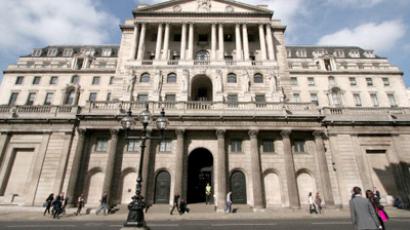UK chancellor's poor debt and deficit statement brings thrashing from Labour, media
With economic projections for the UK economy worse than expected, and as George Osborne prescribes continued austerity and new cuts to social programs, Labour and some economists are calling for a change in tack to kick start growth.
There were few surprises in the chancellor’s autumn statement, with downgraded GDP and deficit targets already the talk of Westminster well ahead of today’s announcement.The city barely batted an eyelid – the pound and UK gilts hardly moved. City traders obviously saw it coming, and the UK for now will cling to its top-notch triple-A credit rating. The TUC Union General Secretary Brendan Barber was quick to pick up on the social implications of Osborne’s policies. “Cuts, austerity and squeezed living standards stretch seemingly without end into the future. What is missing today is any vision of a future economy that can deliver decent jobs and living standards – it's pain without purpose.” The main story in the autumn budget is in the debt and deficit figures. Osborne stuck to his guns, maintaining that a deficit reduction remains his priority, and pointing to the fact that it has been cut by 3% over the last five years. Figures from the Office for Budgetary Responsibility (OBR) support, albeit weakly, his policies. The OBR predicts the economy will contract by 0.1% this year and grow by a modest 1.2% next year. Crucially – as this forms the backbone of the government’s economic policy – the OBR forecasts that the government is on target to eliminate its structural deficit by 2017. Although the coalition had managed to stop some reasonable headlines from being leaked to the media ahead of Osborne's statement, there wasn’t much new in the chancellor’s almost hour-long speech to Parliament.His commitment to slash benefits is creating some of the most controversy. He announced a cut in £4 billion a year from the £117 billion the government spends on social security ever year. “The government has missed its debt reduction target, so we’re now facing an extended austerity program that is going to see us right the way through to 2018. That is not what millions of families right across the UK are going to want to hear, and this is going to affect them in real terms,” Sarah Firth, RT’s correspondent in London, explained. Diane Abbot, a Labour MP in a poor London constituency, told RT it would be the poor who would suffer the most as a result of extending austerity. “Every target that Osborne has set himself, he has failed – he has not met his own targets, and also, there is going to a huge cut to benefit payments to some of the poorest people in the country, who are going to suffer the most as a result of this austerity,” Abbot told RT. There were more sweeteners for the rich in his statement, including a 1% cut in corporation tax. While this makes it the lowest in any Western country, it’s not an area of economics that ordinary voters notice so will make little difference for the government either way. The chancellor’s only announcement that is likely to be well received by hard-up Britons is that the planned 3 pence rise on fuel duty is to be scrapped for good. Osborne announced an ambitious plan of infrastructure projects, considering he plans to continue his austerity drive. They included an extra £1 billion for road building, a high speed rail line to be extended to northern parts of England and £600 million to be earmarked for scientific research. But Ed Balls, the shadow chancellor, was quick to note that much of this money has yet to be committed, raising the question of whether – if the economic slide continues – it ever will be. Balls was adamant that Osborne is mishandling the British economy through his policy of “expansionary fiscal contraction.” The mainstay of Balls’ attack strategy is that Britain is in the longest double dip recession since the Second World War, and the recovery is slower than any on record. “The truth is he’s failed on growth and deficit, and what’s his answer? More of the same,” said Balls to cheers from the Labour benches. Dennis Skinner, the veteran Labour MP for working class district Bolsover, was even more scathing, “This posh boy never changes. Instead of being a Bullington boy who wrecks hotel rooms, now as Chancellor of the Exchequer he wrecks the economy.” The reaction from economists and other observers was more balanced, but still unfavorable. Howard Archer of HIS Global Insight says there is “a very real danger of the UK losing its triple-A credit rating." Philip Aldrick, the Daily Telegraph’s economics editor, was even less complimentary, “If George Osborne’s fiscal credibility were trousers, they’d be round his ankles now.” Andrew Smith, chief economist at KPMG, says the government’s strategy of combining deficit reduction with economic recovery is simply not working. As growth figures are yet again downgraded and the austerity program rolled out to 2018, reduced economic output and pessimistic forecasts “risk becoming self-fulfilling as the corollary is even more growth damping austerity measures,” he writes in the Telegraph.Some analysts say the only way to save the UK's economy is for the government to spend more, not cut spending. “Policies pursued by the coalition government, which tightened fiscal policy too fast, have resulted in lower growth and higher borrowing,” George Eaton, editor of New Statesman's Staggers blog told RT. “The last thing that you should do at a time of economic weakness is to cut public spending at such a fast rate.”














